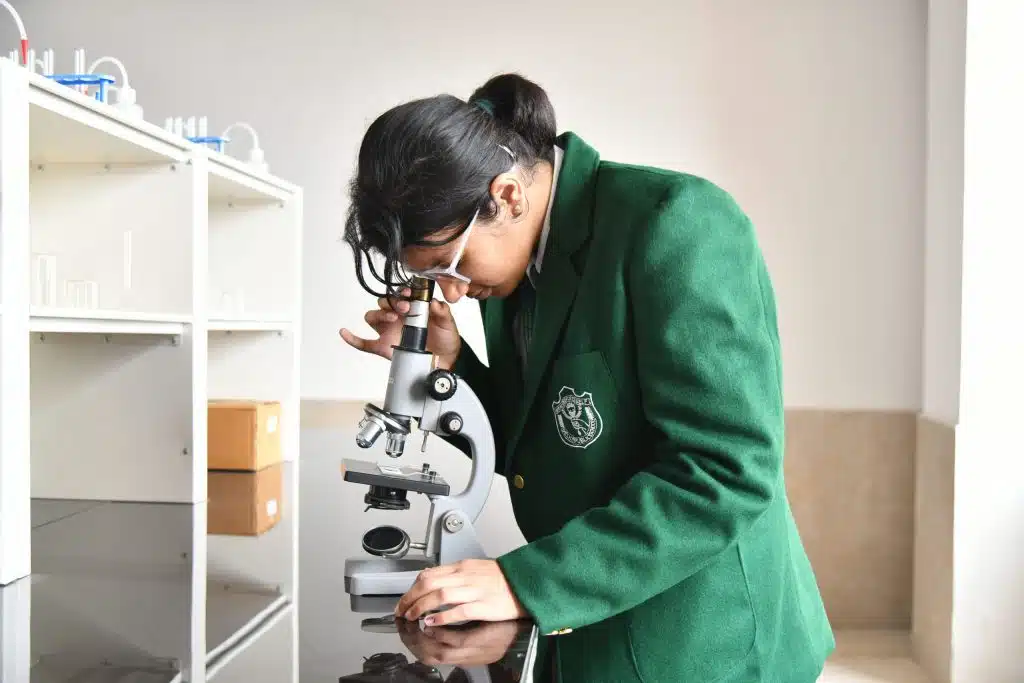How Do School Laboratories Help Students Learn Better?
Some lessons are understood only when students experience them, and that’s exactly what a school laboratory makes possible. Labs help young minds explore, question, and experience how science and technology work in the practical world.
They allow students to witness experiments, understand real-world applications, and develop analytical thinking. Whether it’s mixing chemicals, examining specimens, or testing a circuit, laboratories make learning simpler, exciting, and practical.
In this blog, read about the importance of laboratories in schools and how they help students excel in academics.
Why Are Labs Important in School?
Labs are essential because they bring learning to life. Many ideas taught in class are hard to grasp until students see them in action. A chemical reaction, the structure of a leaf, or the path of light makes far more sense when observed directly.
This hands-on experience is what helps students actually understand, not just memorize, the concepts they study. Students learn to think carefully, question results, fix mistakes, and try again.
A school lab also teaches responsibility, teamwork, and respect for safety. These experiences shape confident learners who understand how things work and why they work the way they do.
Such understanding stays with them for life and supports their academic growth and overall development.
Also Read: What is Meant by Mock Tests & How Does it Help Students?
Types of Laboratories in Schools
Schools have 6 key types of laboratories. They are:
1. Computer Lab: The computer lab introduces students to programming, design, and research. It helps them build digital literacy and prepares them for modern learning tools.
Equipped with computers and high-speed internet, it allows students to practice coding, data analysis, and multimedia projects efficiently.
2. Chemistry Lab: The chemistry lab provides students with hands-on experience in mixing, analyzing, and observing chemical reactions.
Equipped with glassware, reagents, Bunsen burners, and safety gear, it helps students understand theoretical concepts while learning safe laboratory practices essential for scientific study.
3. Biology Lab: The biology lab encourages students to explore living organisms and cellular structures through observation and dissection. Equipped with microscopes, specimens, and models, it enables practical understanding of life sciences, helping students connect theory with natural biological processes.
4. Physics Lab: The physics lab brings abstract concepts of motion, energy, and electricity to life. With instruments like prisms, voltmeters, and magnets, students conduct experiments that explain theoretical ideas and strengthen their grasp of principles such as force, resistance, and light.
5. Mathematics Lab: The mathematics lab is designed to make numbers and formulas tangible. Using models, puzzles, and geometric tools, students visualize and solve problems through real-world examples, building stronger logical and analytical reasoning.
6. Robotics and Innovation Lab: The robotics lab helps students develop creativity and technological skills by building and programming robots. It promotes innovation, teamwork, and design thinking, preparing learners for a future driven by automation and artificial intelligence.
Also Read: How to Improve Handwriting: 9 Easy Tips for Students
Benefits of Laboratories at School for Students
Below are some key benefits that school labs offer.
1. Offers Real Experiences with Learning
Laboratories allow students to perform experiments and directly witness concepts taught in class. Handling equipment and conducting tests make lessons clearer and more impactful than theoretical study alone.
2. Builds Curiosity in Students
When students perform experiments, their curiosity naturally increases. They begin to ask questions, predict outcomes, and explore the reasoning behind each result, transforming learning into discovery.
3. Encourages Students’ Creativity
Lab work encourages students to think differently, form hypotheses, and test new ideas. They learn to approach problems creatively and find innovative ways to understand and apply their knowledge.
4. Helps Students in Independent Learning
This is one of the main important benefits of school laboratories. In a lab, students take charge of their learning. They test ideas, verify results, and develop independence. This ownership of learning boosts confidence and critical thinking.
5. Enhances Critical Thinking
Through experimentation, students collect data, observe patterns, and analyze outcomes. They learn to interpret evidence and make conclusions, sharpening their analytical reasoning.
6. Improves Memory Retention
By engaging multiple senses, seeing, doing, and reflecting, students remember lessons more effectively. Practical learning creates mental connections that make recalling concepts easier during exams.
7. Increases Focus and Attention
Lab activities require concentration and discipline. Watching experiments unfold keeps students attentive and invested in learning, improving academic performance overall.
8. Builds Teamwork and Communication
Many experiments require collaboration. Students learn to share ideas, divide tasks, and discuss findings, developing teamwork, patience, and communication skills that are valuable in every field.
Also Read: 10 Benefits of Reading Newspaper for Students Daily
Equipment in Science Labs at Schools
A science laboratory in schools must include essential tools that make learning effective, safe, and engaging. Common equipment includes:
1. Microscopes: Microscopes help students observe tiny cells, microorganisms, and detailed structures that are not visible to the naked eye. They make biology lessons easier to understand by allowing real-time exploration of living and non-living specimens.
2. Bunsen Burners: Bunsen burners provide a steady flame for heating, sterilizing, and experimenting with temperature changes. They are essential for chemistry activities that require controlled heat and careful observation of reactions.
3. Test Tubes and Beakers: Test tubes and beakers are used for mixing, heating, and storing liquids in chemistry labs. Their simple design helps students handle substances safely while observing reactions and measuring small quantities.
4. Volumetric Flasks: Volumetric flasks allow students to prepare chemical solutions with accurate measurements. Their measurement markings allow precision in experiments that require exact concentrations and reliable results.
5. Lenses, Prisms, and Magnets: Lenses, prisms, and magnets help students explore concepts like light refraction, dispersion, and magnetic fields. These tools turn physics theories into visible experiments, helping students understand how forces and light behave.
6. Tripod Stands and Clamps: Tripod stands and clamps support laboratory equipment during experiments. They keep beakers, flasks, or funnels steady, allowing students to work safely and observe reactions without spills or accidental movement.
7. Measuring Cylinders and Pipettes: Measuring cylinders and pipettes ensure accuracy when transferring or measuring liquids. They help students follow experimental steps correctly and teach them the importance of precision in scientific work.
8. Safety Equipment: Safety equipment such as aprons, gloves, and protective eyewear keeps students safe during experiments. These items teach responsibility while guarding against spills, burns, and accidental contact with chemicals.
Also Read: 20 Qualities of a Good Student That Lead to Success
Common Safety Rules and Discipline in Laboratories
Safety and discipline are crucial to every laboratory session. Schools must educate students about responsible behavior to prevent accidents and promote effective learning.
Basic safety and discipline guidelines include:
- Always wear protective gear such as aprons and gloves.
- Handle all apparatus and chemicals carefully.
- Never taste, touch, or inhale unknown substances.
- Keep the workspace clean and organized.
- Wash your hands thoroughly after each experiment.
- Use equipment only after checking for damage.
- Report any spills or breakages to the teacher immediately.
- Follow the teacher’s instructions closely and work quietly to maintain focus.
- Store chemicals and tools in their proper place after use.
Following these rules ensures that laboratories remain safe, structured, and appropriate to learning.
Conclusion
School laboratories play a crucial role in shaping curious, confident, and capable learners. They encourage creativity, observation, and teamwork, and turn textbook theories into real-world experiments.
Schools like DPS in Gurgaon understand that practical learning is the key to lifelong curiosity and innovation. By maintaining modern, safe, and inclusive labs, they prepare students not just for exams but for scientific thinking, precision, and imagination that support them throughout their lives.


